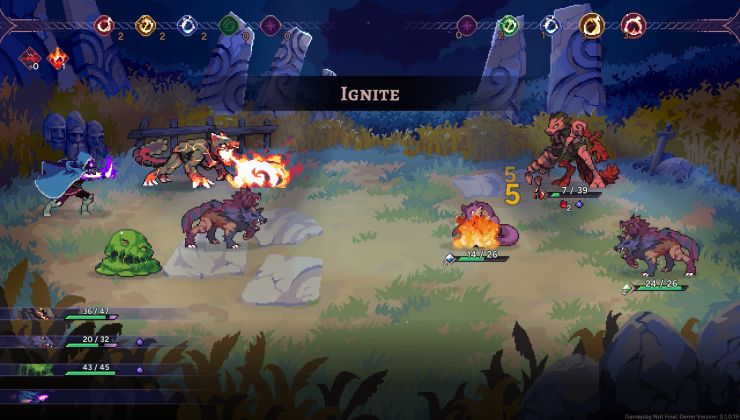
Direct Link
Back to Bed is probably one of the more interesting puzzle games to come out recently with its rather unique style.
The reviews coming in seem to be positive for it, and the only major complaint that I could see was pretty much "it looks like x, but doesn't play exactly like x, so i don't like it". I always find "reviews" like that silly, as you should always play a game for what it is, and not because you think it should be like something else.
We have a lot of puzzle games, but with the quite unique style it should be a good one to pick up.
Official About
Back to Bed is an artistic 3D puzzle game with a surreal twist. It tells the story of Bob, an unlucky narcoleptic who has a tendency of falling asleep in his boring office and then proceeding to sleepwalk into the dangers of the big city. Luckily, Bob has a subconscious guardian named Subob, whom spawns from the mind of Bob and whose job it is to protect the sleepwalker from any danger and guide him back to the safety of his bed.
Check out Back to Bed on Steam.
If you decided to pick it up be sure to come back and tell us what you thought of it.
But where did you read the good reviews? A search on gamerankings.com returned only four very mediocre ones (around 60% rating)?
The user reviews on Steam are 10/11 positive.
Ah - user ratings. Yeah, those are reliable...
I'm sorry but user reviews in general are rubbish - after all they are written by amateurs. Any written review done by unexperienced reviewers are more or less ramblings. And I am not just talking about game reviews - same goes for music, tools, PC equipment, the lot. Why do online stores keep user reviews? Cause on average they are much less critical about what they review than experienced reviewers, so they trigger additional sales. That's why.
I'll make *one* exception: Movies. There's a lot of movie buffs out there who see a lot of films and are quite literate and nuanced about it. They can be trusted to a higher extent.
Reviews done by "amateurs" are generally a good indication of how a game is. Some "professionals" get paid to write good reviews for bad games.
I trust user reviews more than so called critics or professionals.
Reviews done by "amateurs" are generally a good indication of how a game is. Some "professionals" get paid to write good reviews for bad games.
I trust user reviews more than so called critics or professionals.
What experience do you base this on? What made your stance? I'm seriously wondering how one can come to such a conclusion.
Can you for example point at a metascore of a game who you sincerely disagree with and think is totally off the mark?
Cause I could in a whim whip up at least fifty totally bonkers user reviews for almost any given popular title out there - in particular the franchises it has become trendy to hate (COD in particular stands out as an example of how bad it can get).
Sure there are rotten eggs in the professional sphere, just like there are dishonest journalists. Well, doh. Also, it's far too easy to become a reviewer today, especially on the smaller sites, so in those cases one can say that we indeed only get a "user review" from those sources too - there is no difference. I can agree there.
But overall I have to say that the metascore, in my experience, is a darn precise indicator of a games quality. In my view it's the most reliable source we got. If a game hold a meta of 80 or higher you are essentially *guaranteed* to deal with a quality product almost regardless of your personal preferences. And if it holds a significantly lower score than that there usually *are* major drawbacks to be found in the production.
Amateur reviews however... Don't even get me started. I've seen so much crap coming from amateurs on games I own and know, it's not even funny. And *usually* they are far too forgiving, far too uncritical. That is the rule.
With all respect, but in my ears this is like saying, "I trust my Twitter and Facebook stream the most when it comes to reliable news, rather than serious news journalists".
Can you for example point at a metascore of a game who you sincerely disagree with and think is totally off the mark?No, and why would I need to do this? Metascore uses user and publication reviews.
Also you seem to be suggesting I only trust user reviews, but I don't. Like I said I just prefer user reviews a lot of the time as it gives a quick indication of how a game is.
Amateur reviews however... Don't even get me started. I've seen so much crap coming from amateurs on games I own and know, it's not even funny. And *usually* they are far too forgiving, far too uncritical. That is the rule.Exactly the same for "professional" reviews.
They work together to give a good picture, and that is what makes the metascore.
I feel I'm more towards the middle. While I do occasionally scan the user reviews on Steam because there are some very adequate voices on there, there is, as Beam points out, loads of trash. I've seen absolute garbage get recommendations just because the reviewer thought "Let's you walk around 10/10 lolzrofllmao" was such a comedic boon. It's pretty much the same problem I have with Greenlight (see [Grass Simulator](http://steamcommunity.com/sharedfiles/filedetails/?id=276683987)).
On the other hand, there's plenty of "professional" gaming sites whose writers come of as shills or just very dim (See *gag* [Kotaku](http://kotaku.com/microtransactions-coming-to-garden-warfare-this-week-t-1568326126)). I've found the best approach (for me) is to find specific reviewers you trust. Also, someone with similar tastes (in my case, the fellow from IndieStatik) or someone who can be objective enough to recommend a quality game that doesn't fit their own taste (e.g. TotalBiscuit).
My stance came as a result of multiple well known big gaming websites giving a certain game I got stung by 9/10 or 10/10 when in fact it was a steaming pile of turd that thankfully "amateurs" who played it gave a better picture. Some of those sites have since changed their scores.
Would be interesting to hear what game this is, just out of curiosity.
I too have experienced metascore being what I would classify as a little bit off, but my experience is that the metascore in more than 9 out of ten times is an extremely good indicator of the game.
That is simply not true. Metascores - at least those found on real metascore sites - are calculated on reviews from what the maintainer defines as "trusted sources".Can you for example point at a metascore of a game who you sincerely disagree with and think is totally off the mark?No, and why would I need to do this? Metascore uses user and publication reviews.
Some sites that calculate a metascore (metacritic and imdb being two obvious examples) also carry an additional user rating score that is separate from the metascore. And that user rating is, as a rule of thumb, usually much higher than the metascore. Obviously cause amateurs have no experience as reviewers, and either love or hate something. Ergo, either they give it full score or no score.
Look at any site with user reviews and you'll soon discover the vast majority either hand out 4/5 stars (of a max of five) or null to one star. That's just the rule - this is very likely why Steam only has a thumb up or down.
Amateur reviews however... Don't even get me started. I've seen so much crap coming from amateurs on games I own and know, it's not even funny. And *usually* they are far too forgiving, far too uncritical. That is the rule.Exactly the same for "professional" reviews.
You obviously got an impression that this is the case and I'm not here to tell you what to believe. But look at the facts, man. Look at how users rate games on Steam that might have an as low a metascore as down in the 50s!
I feel I'm more towards the middle.That's usually smart. The truth is often found somewhere in the middle. :)
It's pretty much the same problem I have with GreenlightExcellent point.
I've found the best approach (for me) is to find specific reviewers you trust. Also, someone with similar tastes (in my case, the fellow from IndieStatik) or someone who can be objective enough to recommend a quality game that doesn't fit their own taste (e.g. TotalBiscuit).I agree with this advice. Also, especially on releases that's not received a very high metarating, it's wise to read reviews and see what exactly it is that pulled the score down, and if those elements are important for you.
But my experience is that the metrascore is an as reliable source of ratings as it can be, for a very quick indication of overall quality.
I've found the best approach (for me) is to find specific reviewers you trust. Also, someone with similar tastes (in my case, the fellow from IndieStatik) or someone who can be objective enough to recommend a quality game that doesn't fit their own taste (e.g. TotalBiscuit).I agree with this advice. Also, especially on releases that's not received a very high metarating, it's wise to read reviews and see what exactly it is that pulled the score down, and if those elements are important for you.
But my experience is that the metrascore is an as reliable source of ratings as it can be, for a very quick indication of overall quality.
Well, that being said, I'm not really a fan of Metacritic, or scores in general myself. They're all right in a pinch, but a bit too broad a tool in my opinion. Applying numeric value to something so subjective seems shaky at best.
However, I do like the Rotten Tomatoes approach of giving a film a score based on the percentage of critics who recommended it. In that context you're playing with binary values ('yea' or 'neigh') as opposed to something much more complex like visual design. I do like the steam review system for this reason, problems aside.
On top of that, I'm just much more fond of language than I am numbers. A good writer should be able to convey their experience through the use of language, without the need of arbitrary rating systems. Though I do appreciate writers who sum up their feelings at the end because sometimes I'm in a rush ;)









 How to set, change and reset your SteamOS / Steam Deck desktop sudo password
How to set, change and reset your SteamOS / Steam Deck desktop sudo password How to set up Decky Loader on Steam Deck / SteamOS for easy plugins
How to set up Decky Loader on Steam Deck / SteamOS for easy plugins
See more from me